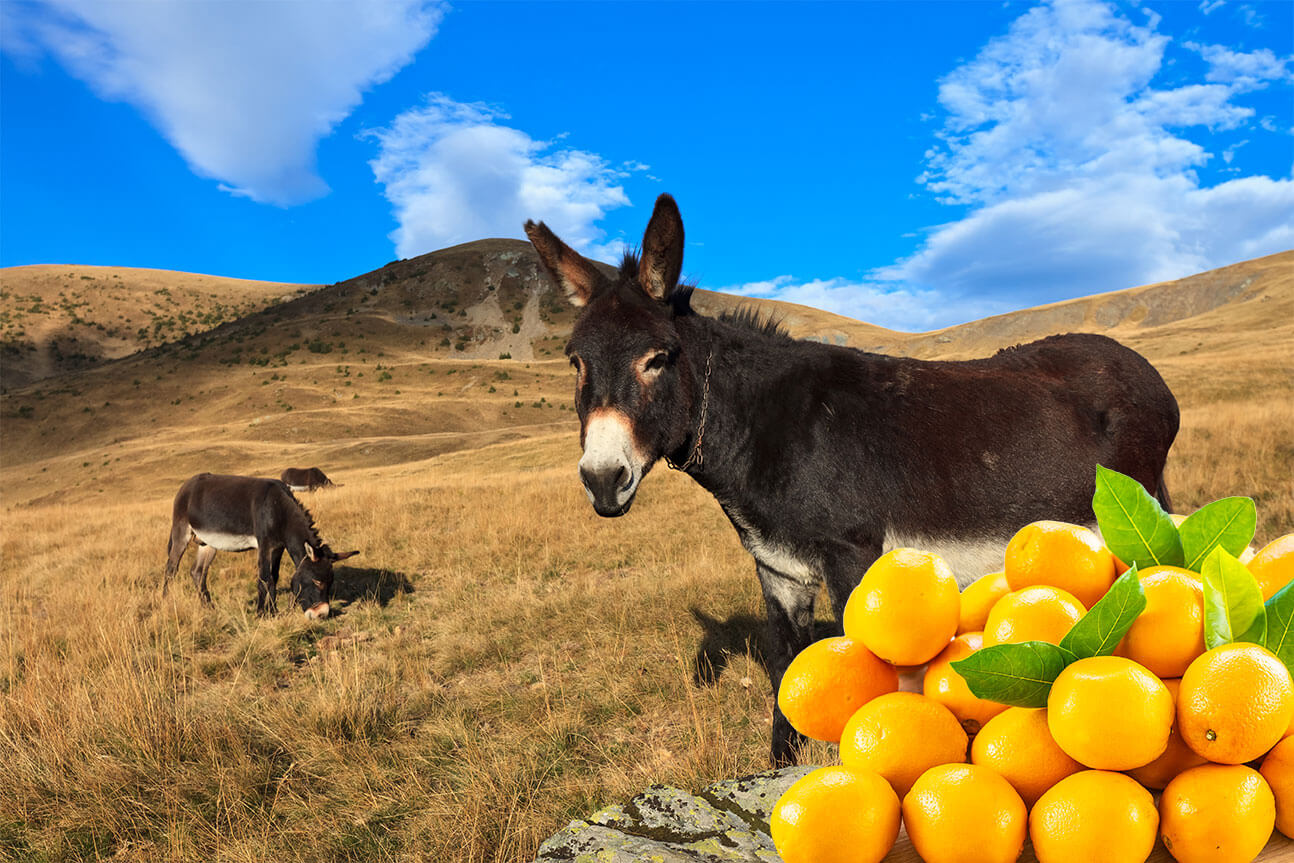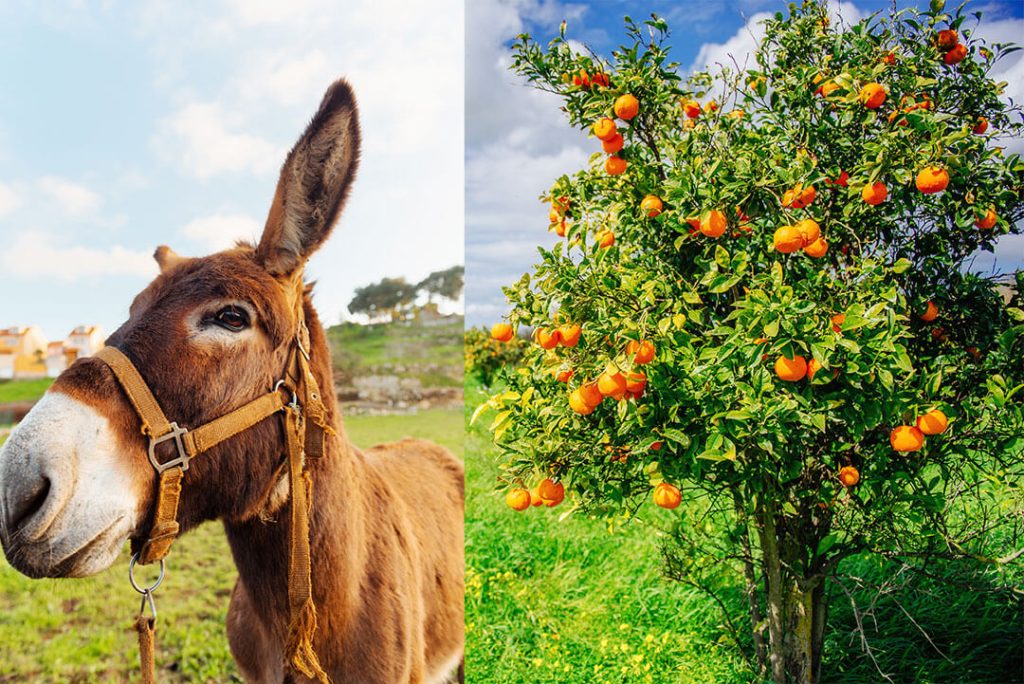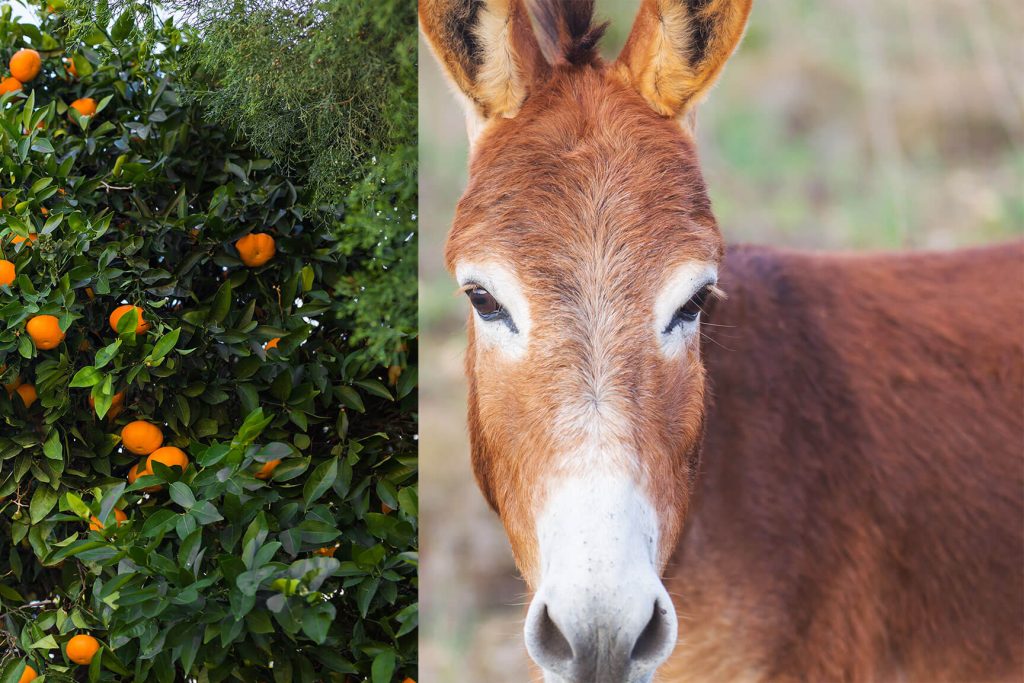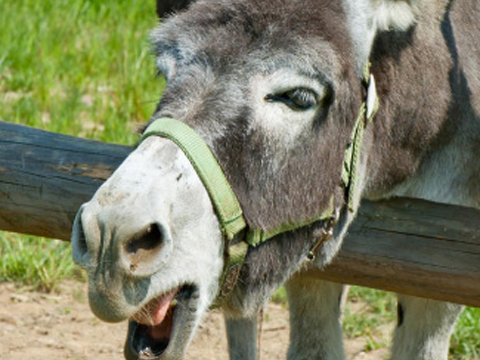Can Donkeys Eat Oranges? A Concise Guide on Donkey Diet

Donkeys are known for their strong digestive systems and ability to adapt to various food sources. When it comes to their diet, many donkey owners wonder if it’s safe to introduce fruits such as oranges. The good news is that donkeys can indeed eat oranges, but with some precautions to ensure their health and well-being. Oranges are packed with essential nutrients like vitamins A and C, as well as calcium, magnesium, and potassium. These nutrients can be beneficial for donkeys, although it’s important to remember that moderation is key. Overfeeding oranges to donkeys may result in diarrhea or other digestive issues. Additionally, it’s advisable to cut the fruit into smaller pieces before feeding it to them, as eating whole oranges might not be the healthiest option for these animals.

Can Donkeys Eat Oranges?
Donkeys can indeed eat oranges, as these fruits are not harmful to them. However, it is essential to be cautious when feeding oranges to donkeys since excessive consumption can lead to diarrhea
While donkeys are known for their love of eating oranges whole, it may not be the healthiest way for them to consume the fruit. Moreover, orange peels can be beneficial for donkeys, as they are rich in fiber and contain vitamins A and C, calcium, magnesium, and potassium.
It’s also worth noting that not only can donkeys eat oranges, but they can also safely consume orange tree leaves, which possess potential sedative effects and help combat coughs, nerve spasms, and stomach cramps. However, some donkeys may not find the taste of the leaves appealing due to their bitterness.
To sum up, it is safe for donkeys to eat oranges in moderation, but avoid feeding them excessive amounts to prevent gastrointestinal issues. Offering donkeys a varied diet that includes other safe fruits and vegetables can help provide them with balanced nutrition.
Donkeys’ Dietary Needs
Understanding the dietary needs of donkeys is essential for maintaining their overall health and well-being. This section provides insights into the basic nutrients they require, their ideal diet, and safe fruits and vegetables to include in their diet.
Basic Nutrients and Diet
Donkeys have specific dietary requirements that differ from other equines. They thrive on a diet high in fiber, low in protein, and low in carbohydrates. Their primary source of nutrition should stem from fibrous materials like grass and hay, which promote dental health and aid in proper digestion. Donkeys also benefit from a small amount of grains to supplement their diet, ensuring that they receive sufficient energy and nutrients. However, it is crucial to avoid feeding them excessive grains, as this can lead to health issues such as obesity and gastric ulcers.
Donkeys can also safely consume oranges as treats, as long as they are given in moderation. Consuming too many oranges may lead to digestion issues and stomach cramps due to their high sugar and fiber content. When feeding oranges to donkeys, it is important to cut the fruit into sections, as both the skin and seeds are safe for them to eat. Remember to avoid feeding donkeys any toxic foods, such as potatoes, brassica family vegetables, onions, leeks, garlic, or stoned fruits. Also, avoid anything old, fermented, or moldy.

Benefits and Risks of Oranges and Other Fruits for Donkeys
Vitamins and Minerals in Fruits
Oranges provide donkeys with essential vitamins and minerals, such as vitamin A, that can help maintain their healthy organs and eyesight. They are also rich in vitamin C and potassium. Vitamin C supports immune system function and aids in healthy joint function, which may be beneficial for donkeys with arthritis or joint issues.
Other fruits, like apples, pears, and bananas, are also safe for donkeys and offer a variety of beneficial nutrients. For instance, apples and pears are rich in fiber and potassium, while bananas provide significant amounts of vitamin C, magnesium, and potassium.
Potential Health Issues Associated with Fruits
Though fruits have numerous health benefits, there are some potential health concerns associated with excessive consumption. Oranges and other sugary fruits can lead to obesity in donkeys when consumed in large amounts, as donkeys are prone to weight gain when fed a sugar-rich diet. Overconsumption of oranges can also cause digestion issues and stomach cramps due to their high fiber content.
Laminitis, a painful and potentially crippling condition that affects the hooves of horses and donkeys, is another concern when feeding sugary fruits such as oranges, apples, and bananas. Some equids are more prone to developing laminitis, so it is crucial to monitor and moderate their fruit intake to prevent exacerbating the condition.
In conclusion, while oranges and other fruits offer several nutritional benefits for donkeys, it is essential to feed them these treats in moderation to avoid health issues such as obesity, digestion problems, and laminitis.
Fruits and Vegetables to Avoid
While donkeys can safely consume various fruits and vegetables, there are specific items in their diet that should be avoided or limited. These foods can be toxic or cause health issues if consumed in large quantities. Some of the fruits and vegetables to avoid include:
- Onions, leeks, and garlic – These can cause anemia in donkeys due to their high levels of organosulfides, which can damage red blood cells.Apricots, peach, and plum – These fruits are considered unsafe for donkeys mainly because of their stones, which can cause choking hazards or release cyanide-like compounds when crushed.Grapes – Although not toxic for donkeys, grapes should be fed in moderation due to their high sugar content.Peppers – While not toxic, they may cause gastrointestinal discomfort if consumed in large amounts.
Feeding Recommendations and Moderation
When it comes to feeding donkeys, moderation is key to maintaining their health and preventing obesity. One fruit that can be given as a treat is oranges, but it’s important to do so with caution. Oranges are safe for donkeys and can add vitamins and minerals to their diet, but should always be fed in moderation as they are high in sugar and can contribute to weight gain.
Oranges may be fed in small quantities to avoid digestive issues and stomach cramps caused by the high fiber content (source). Be sure to cut the fruit into small pieces for easy digestion. Other fruits such as apples, pears, and bananas can also be fed, but again, in moderation.
It’s crucial to maintain a balance between hay, water and treats to ensure optimal digestion and overall health. Donkeys should have access to clean, fresh water to keep their digestive system functioning properly. Consulting a veterinarian for specific feeding guidelines and recommendations for your donkey is always a good idea.
Monitor your donkey’s appetite and general health when introducing new treat items into their diet. If you notice any changes or issues, consult your veterinarian immediately. Remember, moderation is essential when feeding oranges and other fruits to donkeys to prevent any negative impacts on their health.
Supplementing with Other Foods
While donkeys thrive on a diet consisting mainly of fibrous plant material like hay or straw, supplementing their diet with other foods can ensure they receive essential vitamins and minerals. Offering fruits and vegetables like oranges provides additional health benefits and can promote their overall well-being. However, always make sure to monitor portions and avoid feeding your donkey seeds or pits, as these can cause digestive issues.

